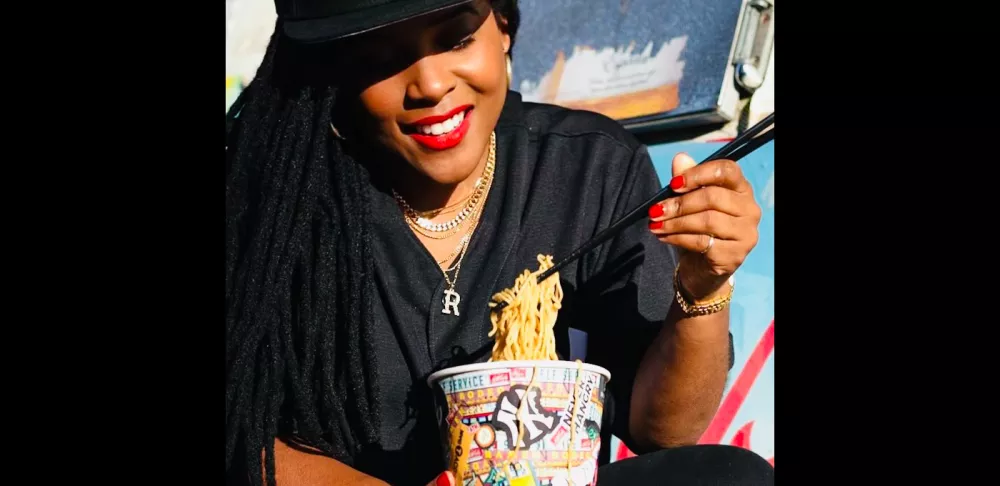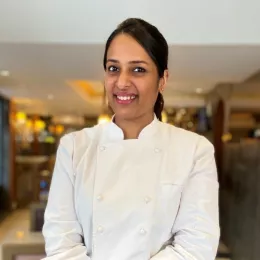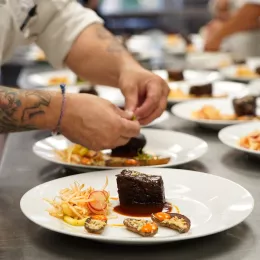“What I've learned through culinary school is everything's about relationships. Everything is about getting to know someone. Helping. Saying ‘yes.’”
Those words of wisdom from recent ICE alumna Rasheeda Purdie were just some of the gems students enjoyed during her recent visit and demonstration at ICE’s New York campus.
A 2015 graduate of ICE New York's Culinary Arts program, Chef Rasheeda, the “Ra” of “Ramen by Rā,” took her love of community and passion for sharing culture through food and poured it into a ramen bowl. While demonstrating how to make her signature soy egg, Chef Rasheeda answered student questions and shared some insights about the culinary industry.
“The culinary industry is true dedication, true passion, true heart, true will, thick skin, all of the above,” she says.“I can go on and on, but all of that is worth it once you see someone sit there and eat your food— the language that you communicate to diners without words.”
A former professional stylist, Chef Rasheeda relates to many students who identify as career changers. During the demo, she assured all of the students that answering the call to follow one’s true passion is worth the growing pains and changes they would face.
“It was glitz and glam and I said ‘no, I want to cook.’ My best self is in the kitchen,” Chef Rasheeda says.
She credits her decision to attend ICE as the start that brought her such success.
“If I didn't have ICE, I wouldn't be here,” she says.“I wouldn't have this ramen experience and I wouldn't have a story. So you always gotta channel back to where your roots are…I started at ICE seven years ago this month, it was my first experience of what you call ‘no days off’ and I have not looked back ever since.”
In addition to guidance about life in the culinary world, Chef Rasheeda also shared snippets of her creative process. Using one of her most popular summer ramen dishes as an example, she broke down every strategic step she took when coming up with the recipe.
“I literally think of salads in the form of ramen — that's why [the recipe uses] spinach noodles,” she says. “If spinach plays well with a watermelon and cheese like we eat in the summer, then I feel like that will work for me in the summer for noodles. So, if I am doing spinach noodles I can dress that with a ‘dressing’ which is a play on broth, and then all of those different components help me create ramen bowls which are inspired by salads and the flavors of salads.”
The cold watermelon version was just one of the many speciality ramen dishes that put her pop-up, Ramen by Rā, on the map. Starting in DC her unique ideas have included:
- A cherry-blossom inspired ramen with a coconut milk base
- A Juneteeth ramen with korean barbecue meat and watermelon poke
- Her “homage to Harlem, Chopped Cheese” ramen-- a specialty sandwich found at New York City bodegas that truly shocked and impressed
All this creativity landed Rasheeda with an opportunity to showcase her fares at Melba’s, the legendary soul food standard bearer restaurant in Harlem.
For this, she produced her “Pot-licker” ramen, with the flavors of the full Thanksgiving meal she grew up with, all in one bowl. The dish featured smoked turkey, collard greens, soy egg, fried garlic, bean sprouts and more.
When creating the dish, Chef Rasheeda found inspiration in the intersection between ramen broth and collard greens. Both are traditionally cooked “low and slow,” giving their deep, savory flavors time to develop.
“Why not tell your story? Or try out different cuisines together if you see the similarities,” she says.”That's what I saw. When I cook broth, I'm like, ‘I feel like I'm in my grandmother's kitchen right now cooking collard greens.’”
This passion for returning to her roots was a consistent message throughout Chef Rasheeda’s time at ICE that no doubt will continue through her career.
“My goal is just to make people happy through the fusion of cultures through food. That's what makes me happy,” she says. “It really is a cliché, but it's not — when you [can] really look across the room in the dining room and you see people eating your food and the language is speaking but you're not saying any words — remember that. Energy is transferred and it's clearly transferred into every dish that you touch."
More Alumni Stories: Stuffed Collard Green Wraps with Chef Shenarri Freeman






